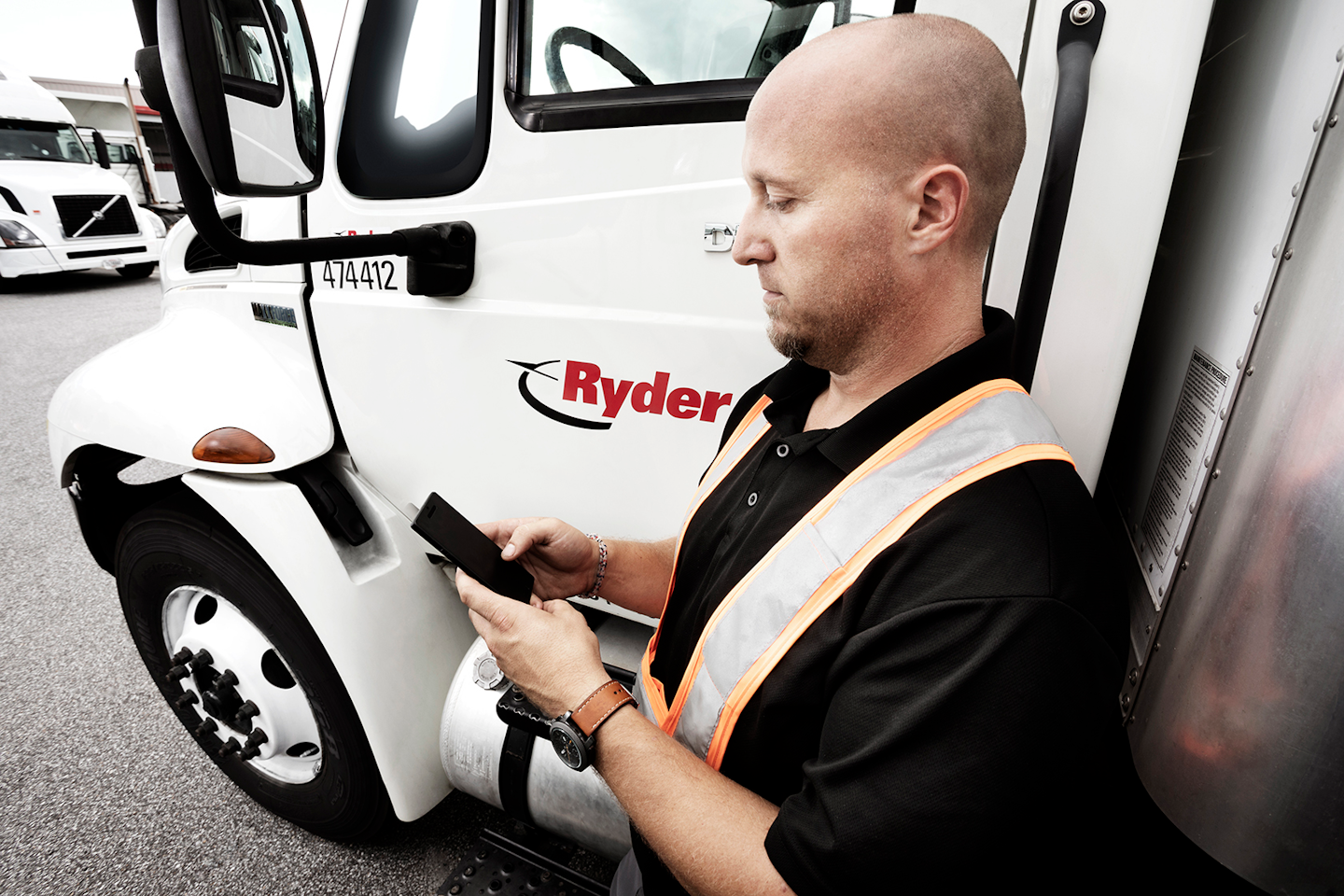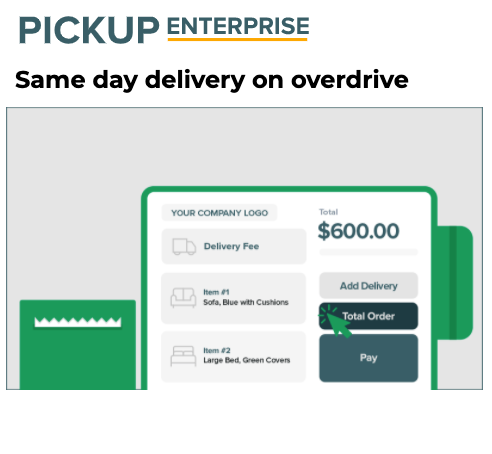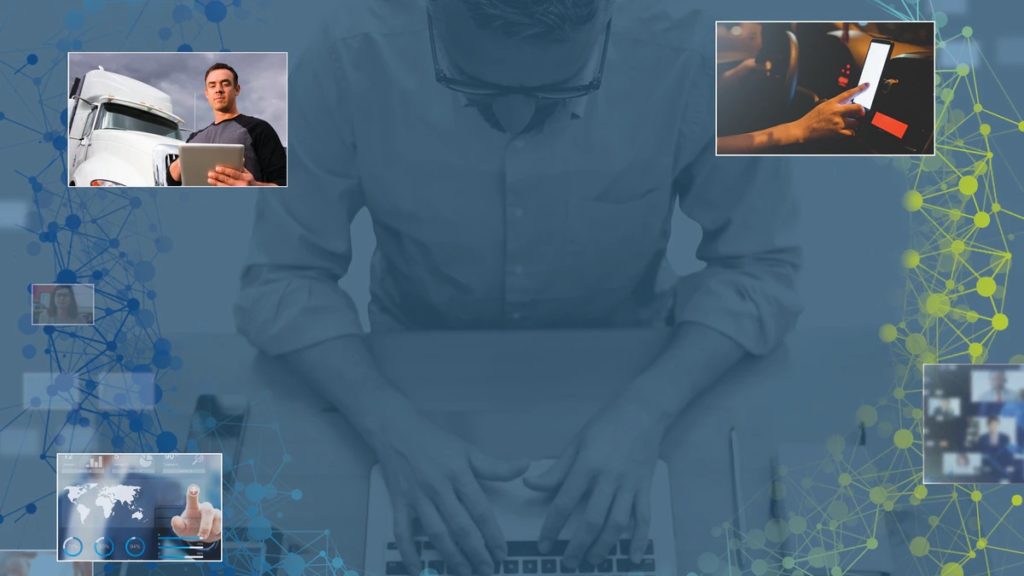The need to keep essential workers like truck drivers safe during the pandemic has accelerated trucking’s inevitable move to a paperless world.
It was only a matter of time before the paper-filled ways of the 20th century were abandoned in the 21st. Rather than slow erosion of the need for physical documents, pens, fax machines, scanners, and other items, the COVID-19 pandemic has accelerated the movement to a contactless freight workflow, making essential workers like truck drivers safer.
For the past few years, leaders at J.B. Hunt have wondered why one of the largest for-hire carriers in North America was still relying on paperwork, inked signatures, and passing paper from hand-to-hand as its drivers picked up and delivered freight across the country.
“We always knew that technology could solve for that, but it really wasn’t until this pandemic that we created the answer to that very quickly,” Shelley Simpson, J.B. Hunt’s chief commercial officer and executive vice president of highway operations, said during an FTR Engage virtual speaking series event in September. “We created our electronic bill of lading, a contactless way for both our driving community and carriers that interact with us and at our customers’ locations, their employees could actually transact without ever coming in contact, creating more safety for them.”
Over the summer, J.B. Hunt introduced an electronic bill of lading, which it calls e-BOL, to its Carrier 360 digital platform, which helps fleets find and manage loads. The e-BOL has cut down on physical contact during deliveries by allowing fleets to upload documents and receivers to sign for the deliveries electronically.
Before the pandemic, Simpson said it would have taken a while to slowly adapt to a paperless freight world as all parties involved would have been given time to ease into this new way of business. “Instead, through COVID, we really disrupted the old way, figured out how to change that process and people adapted very quickly.”
J.B. Hunt has folded social distancing into the carrier’s safety culture. “With safety being a key component in our culture, it has been a smooth transition for our delivery teams to adopt new practices,” according to John Vargo, senior vice president of final-mile services operations. “It is our goal to provide an environment that is as safe as possible for consumers and our delivery teams.”
Essential drivers in a COVID world
Truck drivers are among the most COVID-susceptible workers in America, according to the Centers for Disease Control, which notes that drivers can be exposed to the virus in numerous ways while working. From being in close contact with others at truck stops, in stores, and at loading docks, drivers can be exposed to the virus, which spreads from person-to-person through respiratory droplets. Those droplets can be spread through the air or by touching a surface or object — such as papers and pens — that has the virus on it and then touching one’s face, mouth, nose, or eyes.
Drivers who find ways to limit in-person interactions to complete their job can be safer, according to Microdea, which developed a document management app called Origin that allows entirely paperless delivery with electronic proof-of-delivery (ePOD).
An ePOD system allows drivers to stay in their cabs by receiving and submitting all necessary paperwork using a smartphone, to encourage isolation on the road. This protects dock workers and receivers. The Origin app also means drivers need to make fewer stops, such as pulling over at truck stops to use a scanner. This can give drivers more time to drive, a bonus when driving hours are at a premium due to hours of service requirements. The ePOD system also helps fleets’ offices be more productive as the app instantly sends paperwork to the carrier’s office, so there is no waiting for drivers to turn in paperwork physically.
Microdea’s development of an ePOD solution was born out of the pandemic. “When COVID hit, we started working on a process to keep the interaction between drivers and receivers and drivers and shippers down,” Zehra Hussain, a Microdea product manager, said during a Truckload Carriers Association webinar on contactless delivery.
 hoto: Ryder
hoto: Ryder
The problem with paper
While COVID propelled the company to develop Origin, physical paperwork has been an ongoing problem for Microdea’s fleet customers — particularly getting those documents from drivers to the back office, Hussain said. The company compiled the five most common problems with paper documents:
● Lost documents
● Billing delays
● Data entry for drivers and staff
● Unnecessary stops for drivers
● Expensive and hard-to-maintain hardware, such as in-cab scanners
“In order to solve these problems, Microdea — and other organizations — realized that mobile scanning solutions are the option that will work the best,” Hussain said. “The main emphasis for this (development) was to get the documents back to the office in real-time as soon as possible — as soon as the drop off is done. We wanted to eliminate indexing and to bill the customers as soon as possible. So that was the goal. And we were able to achieve that with the Origin mobile app.”
With Origin, Hussain said that fleets benefit by not losing documents, requiring less data entry by drivers and other staff, better image quality of documents than traditional scanners or faxes, no hardware requirements (other than smartphones), and fewer stops for drivers.
Less data entry was a big goal, according to Steel Roddick, a writer and market researcher for Microdea. With the mobile capture app, everything is automatically tied to a load. “This is a big efficiency gain, making it easier for drivers to minimize the amount of data entry they have to do,” he said. “That just makes everything so much easier on the back end for office staff, so they don’t have to do any sorting — documents just flow directing into your TMS and are already tied to a specific load. So, you really do minimize all those errors and time-consuming, mind-numbing work.”
Roddick added that making all documents digital allows fleet employees who work remotely access to this information anywhere, so they don’t need to be crowded in an office with their coworkers during the COVID era.
These are benefits that will outlive the pandemic, Hussain noted. “During extraordinary times, like the one we’re in right now during COVID, there’s the benefit of less interaction between the people who are at the dock and the drivers themselves,” she said. “So, social distancing is maintained.”

Last-mile
Drivers and shippers aren’t the only people looking to limit in-person interactions during the pandemic. Consumers are also looking for ways to be socially distant without being limited in what they can buy. PICKUP, a Texas-based last-mile delivery service and logistics platform, has been scaling up its local delivery capabilities to meet what it called a “surging demand for store-to-door delivery.”
“In light of a 108% surge in e-commerce, accelerated by COVID-19 and social distancing, PICKUP quickly responded to the increasing consumer demand for contactless, last-mile delivery from store, curb or distribution center in 51 markets across the country,” CEO Brenda Stoner said.
Over the spring, when many of PICKUP’s retail partners closed their doors as local governments imposed economic shutdowns in a failed attempt to control COVID’s spread, the company saw the need for e-commerce fulfillment skyrocket. Before COVID, PICKUP was focused on delivering big and bulky retail goods, but it made a COVID pivot to support its retail customers by providing an e-commerce solution for smaller goods and groceries.
“We have heard from many existing and new partners that there is a significant need for reliable same-day service on bags and smaller items,” Stoner said. “In response to the current environment, we accelerated the development and release of this consumer-friendly lower rate via our website and directly with select retail partners.”
The company developed PICKUP Enterprise, which it describes as a technology solution that supports buy online delivery from stores (BODFS), supported by its omnichannel, delivery-as-a-service (DaaS) platform. Enterprise offers customers a signature-free, contactless, same-day delivery service, which allowed its retailer-partners to scale from in-store purchases to an e-commerce model quickly.
Since launching PICKUP Enterprise in April, the company’s retailer customers have seen online purchases nearly doubled and 23% more sales over the buy-online-pickup-in-store model as of October. The company recently partnered with Postmates, an online platform that offers customers on-demand delivery from more than 600,000 restaurants and retailers nationwide.
“PICKUP Enterprise with Postmates empowers consumers to shop where, when and how they choose — e-commerce, store, warehouse, and more — while reducing logistics costs and increasing customer lifetime value for retailers,” Darren Waxman, PICKUP chief revenue officer, said.
Companies such as PICKUP have been able to grow during the pandemic-induced recession. And it is not alone, according to J.B. Hunt’s Simpson, who noted that the giant e-commerce retailers have got even bigger in 2020. “I think the same thing happened for carriers,” she said. “Carriers that digitally were already set up, were set up to win.”
By Josh Fisher
CUT COTS OF THE FLEET WITH OUR AUDIT PROGRAM
The audit is a key tool to know the overall status and provide the analysis, the assessment, the advice, the suggestions and the actions to take in order to cut costs and increase the efficiency and efficacy of the fleet. We propose the following fleet management audit.




